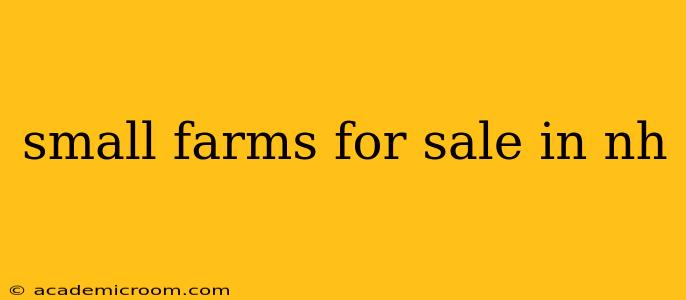New Hampshire's picturesque landscapes and thriving agricultural community make it a desirable location for those seeking a small farm. Whether you dream of raising livestock, cultivating organic produce, or simply enjoying the tranquility of rural life, finding the right property can be an exciting but challenging endeavor. This comprehensive guide will help you navigate the process of finding small farms for sale in NH, covering everything from understanding your needs to successfully closing the deal.
What are the typical sizes of small farms in NH?
The definition of "small farm" can be subjective and varies depending on the intended use. In New Hampshire, a small farm might range from a few acres suitable for hobby farming and a small garden to several dozen acres capable of supporting livestock and a larger-scale operation. Some might be comprised of primarily pastureland, while others might feature a mix of woodland, tillable land, and existing structures. Your ideal size will depend on your goals and resources.
What are some common features to look for in a small NH farm?
Beyond acreage, several key features should be considered when searching for a small farm in NH:
- Soil Quality: Conduct a soil test to determine its suitability for your intended crops or pasture. New Hampshire's soil varies significantly by region.
- Water Sources: Access to a reliable water source (well, spring, or stream) is crucial for both human consumption and irrigation. Investigate water rights and potential water quality concerns.
- Buildings & Structures: Assess the condition of existing barns, sheds, or a farmhouse. Determine if they meet your needs or require significant renovation or repair.
- Accessibility: Consider the location's accessibility, proximity to roads, and distance from essential services like veterinary care or agricultural supply stores.
- Zoning Regulations: Research local zoning regulations to ensure your intended agricultural activities are permitted.
How much does a small farm in NH typically cost?
The price of a small farm in New Hampshire varies greatly depending on location, size, improvements, and condition. Factors like proximity to larger towns or scenic areas can significantly impact the asking price. Expect to invest considerable time in researching comparable properties and working with a real estate agent specializing in agricultural land.
What are the different types of small farms available in NH?
Several types of small farms are available in New Hampshire, catering to various interests and farming styles:
- Hobby Farms: Smaller properties ideal for supplemental farming, gardening, and raising a few animals.
- Pasture-Based Farms: Farms primarily consisting of pastureland, suitable for grazing livestock like cattle, sheep, or goats.
- Mixed Farms: Farms that combine crop production with livestock raising.
- Organic Farms: Farms that follow organic farming practices, emphasizing sustainable methods.
What resources are available to help me find a small farm in NH?
Several resources can assist you in your search:
- Real Estate Agents: Work with a real estate agent specializing in agricultural land. They have access to listings that may not be publicly advertised.
- Online Marketplaces: Several online platforms specialize in listing agricultural properties.
- Local Agricultural Organizations: Connect with local agricultural organizations and farming communities for networking opportunities and potential leads.
- Networking: Attend local agricultural events and fairs to connect with other farmers and potentially discover properties for sale.
What are the hidden costs of owning a small farm in NH?
Beyond the purchase price, consider these hidden costs:
- Property Taxes: Property taxes in New Hampshire can be significant, particularly for larger properties.
- Maintenance & Repairs: Maintaining buildings, fences, and equipment requires ongoing investment.
- Insurance: Obtain appropriate insurance coverage for your farm and its operations.
- Utilities: Costs associated with electricity, water, and heating can vary depending on the property and its location.
Finding the perfect small farm in NH requires careful planning, research, and patience. By understanding your needs, researching potential properties thoroughly, and utilizing available resources, you can increase your chances of finding the ideal location to pursue your agricultural dreams. Remember to consult with professionals throughout the process, including real estate agents, agricultural lenders, and legal counsel. Good luck with your search!
